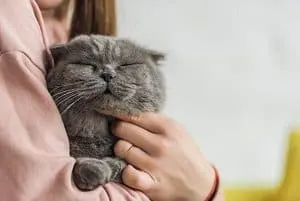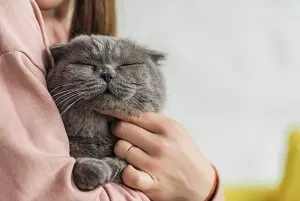 The joke among cat lovers is that the cat owns the person, not the other way around. Cat owners are among the most loyal pet parents around, but are cats equally possessive of their owners? The answer just might surprise you.
The joke among cat lovers is that the cat owns the person, not the other way around. Cat owners are among the most loyal pet parents around, but are cats equally possessive of their owners? The answer just might surprise you.
So, are cats possessive of their owners? Yes, cats are possessive of their owners. While cats can be incredibly independent creatures, they are equally willing, and arguably happier, when bonded to their owners. Social interaction is vital for every pet; it is essential if you want a close bond with your cats.
As a cat owner, the key is in how we have chosen to interact with our cats, and understand how they are interacting with us.
In this article, I’ll share some unique ways to interact with your cats and build a healthy bond with them! I’ll also share how to deal with a cat that may be overly possessive of you or others in the home.
Socializing With Your Cat
Once cats are weaned from their mother and are brought into a human household, what you choose to do next makes a big difference in how your cat will respond to you throughout their life. To foster a bond with your cat, you should spend at least two 20 minute sessions a day engaging in each of these interactions with your cat:
● Talking – Admittedly, at first, it seems weird to talk to your cat, mainly if you aren’t accustomed to it. The good thing is that your cat will enjoy the interaction, no matter what you are telling her. I always speak to my cats in a high-pitched voice and tell them about my day, interjecting with a meow or two as they respond to me.
● Playtime – Particularly, when young, cats form bonds through play.
Whether playing with a string, a toy, or just your hand, cats learn to trust their owners through these play sessions.
Even with my older cats, who never play more than a few minutes, I always allow them to play every day.
● Petting and physical attention – Cats are incredibly tactile creatures that very much enjoy physical attention from their humans. Again, this is a bonding ritual of sorts. Petting your cat, at least for them, is reminiscent of being groomed by their mother when young.
By socializing regularly and methodically with your cat, your cat, in turn, will begin to bond very strongly with you. It’s also understandable that a cat who is used to spending time with you will become possessive if you break the routine. In that case, it helps to help your cat adjust gradually to the amount of time they will spend with you. By doing this they will be more willing to allow you to interact with others.
Understanding Feline Vocalizations
Several studies have shown that cats meow primarily, if not exclusively, for people.
The communication between cats does include some vocalizations, but typically more of a growl/whine/hiss type sound variety. Meowing, for some reason, seems to be reserved for people.
Typically, I try to always respond to my cats’ meows. Cat meows are unique, and they will develop several different ones to get your attention. They are not typically the same for each cat and seem to be entirely personal, and most likely based on how quickly they get a reaction from you.
I have one sweet girl who has a very distinct meow she uses when she wants food or attention, and a very different, throaty, loud meow when she has brought me a “present” of sorts – the stray lizard or snake that wanders onto our sun porch. I always acknowledge the meows from my cats because I know they are created to communicate with me. By always responding, it allows me to bond more closely with my cats.
Cats also vocalize through mews and purring. Purring is typically a sign that your cat is happy and content, but it can also occasionally occur if your cat is feeling unwell, as it helps to relax the animal. When I interact physically with my cats, if they start to purr, I will continue to rub and scratch them.
If they don’t, I will step back a bit and observe their behavior. Cats will also trill, click and mew to communicate. However, these types of sounds are not necessarily geared strictly to humans. They will use different vocalizations to express contentment, excitement, and sometimes fear.
Possessive Cats And Body Language
Another way to ensure bonding with your cat is to understand their body language. Cats are pretty unique in some of their behaviors, but other body language behaviors are typical among our feline friends.
● Slow blinks – A very subtle, but telling behavior is blinking. If you notice your cat keeping eye contact with you, and slowly blinking, blink back. You will see a pattern of “communication” with your cat. This is meaningful to him and suggests trust.
● Head bump – Cats in the wild and undomesticated large cats also engage in head bumps with each other. The bump may be a simple push into your face or head, or a sweeping motion across your face. This is a show of love from your cat and a way of marking you as part of his cat family.
● Tail positions – Cats communicate through their tail. A cat who approaches you with his tail up is interested in interacting, or curious. A tail held low, or between his legs communicates fear perhaps, or some trepidation. A tail wildly swishing back and forth typically means she is irritated.
By understanding and reacting appropriately to your cat’s body language, it will help your cat build trust and loyalty with you.
Are Male Cats More Possessive Than Females
One question I often get is about male cats and female cats.
In general, male and female cats are equally possessive of their owners. Male cats and female cats show the same amount of affection. How much affection your cat shows depends on several factors. This includes:
- Breed
- Age
- Time spent together
- Upbringing
- Overall Physical Health
There are some instances where female cats may show less affection while they are in heat. They tend to be less interactive than males who become more affectionate at that time.
How Cats Show Their Loyalty
So, what does all of this mean? Do cats see their owners as big, less furry cats? Do they feel that their owners are part of their family, or only there to test their patience and tolerate their existence? How do cats even show loyalty?
For anyone who has ever owned a cat, you probably notice that cats typically pick “their person.” So how do they decide? First, it’s best to understand how cats see humans in general.
Cats, domesticated many years ago, are not pack animals, in the way dogs are. When dogs are introduced into a household, they see their humans as part of their pack. Within each pack, there is one person in charge, the Alpha. Dogs show loyalty through that pack behavior and are loyal by pack design, mainly to the Alpha.
Cats are very different. Cats are naturally independent creatures and are not part of a pack, though they can happily co-exist. There is no hierarchy of control, with anyone cat or person being the alpha. Cats see their owners as equals.
They love you and are loyal to you because you communicate well with them. They, of course, depend on you for food, shelter, and security, but cats mainly pick their person based on communication. If you communicate best with your cat, you will be their person, and as such, win their loyalty.
How they chose to communicate is unique to each cat. Some cats like a lot of vocal attention, playtime, physical touch. Some cats are lap cats, and others are content to be in the same room as you.
If you learn, through play, watching their body language, listening to their vocalizations, and as such, communicate well with your cat, they will gravitate toward the person who best understands their needs. Once a cat has decided that they are loyal to you, the bond is incredibly strong. Cats show loyalty by sticking close to their human companion, by meowing and purring and rubbing up against their chosen person.
Most cats look to their owner for love, attention, food, and play. In return, they are wonderful companions. They lay on your lap, sleep by your side, and genuinely seem to care.
Cats are great emotional companions, especially during challenging times in life. If I were sad, sick, or lonely, my cat would not leave my side. I often hear similar stories from other cat owners, who believe, like I do, that cats can be sensitive to emotion, and will frequently offer comfort when needed.
Building A Bond With Your Cat
While admittedly, building a loving bond with a cat can take a great deal of commitment and work, it is definitely worth the effort. Cats will not give you their love and loyalty freely, but as anyone who has bonded with a cat will tell you, cats are one of the most loyal animals on the planet.
Please take the time to bond with them each cat individually. If you have a cat who has chosen you as their owner, you know you are loved, even if that love comes with a lot of work! There is simply nothing better than the love and the loyalty of a cat.

My name is James, and welcome to FAQCats!
Along with our team of cat owners, expert pet enthusiasts, and pet professionals, we aim to write engaging helpful, engaging content about cats. At FAQCats we strive to provide content that’s accurate and fun to read. Our team writes about everything related to cats; even the most complex of topics. Through extensive research and caring for our own fur-pals, we’re able to provide something cat owners worldwide will love. Have a look around, and leave us feedback anytime!

